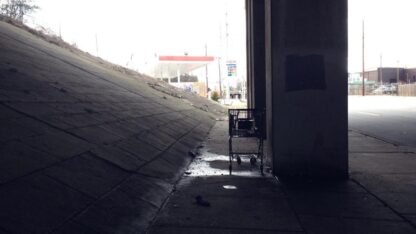Throughout the nation, it’s estimated there’s a current shortage of 4 to 7 million affordable housing units. Both renters and buyers are faced with uncertainty while navigating the unbalanced market. Renters typically need to meet stringent requirements, including making at least three times the monthly rent. Meanwhile, people wanting to purchase a home have a limited selection of housing options due to low housing inventory and high home prices.
Research suggests the struggle to maintain stable housing can take a toll on one’s mental and emotional health. Many people experience heightened anxiety, stress, depression or other mental health issues. For the third national PRX show on “Closer Look,” host Rose Scott explores the mental health consequences of housing instability and possible solutions.
First, Adán Bean centers the experiences of people who are experiencing homelessness in a spoken word performance in downtown Atlanta. Bean seeks to share what a day and life is like for someone who is experiencing homelessness.
We then hear from Cheryl Carter, the executive director of HomeStretch, and Tawana Thompson, a participant in the HomeStretch supportive housing program. Thompson explains how being without stable housing took a toll on her and daughter’s mental health and how their lives were transformed through HomeStretch’s program. Carter talks about her organization’s work to disrupt the cycle of homelessness.
Scott then talks with Shanquita Tate and CJ Stewart, a former Chicago Cubs outfielder and co-founder of the Atlanta-based LEAD Center for Youth. Tate talks about the challenges she and her husband are currently facing as they try to find stable housing for their four children. Stewart explains how his organization is working to help the Tate family.









